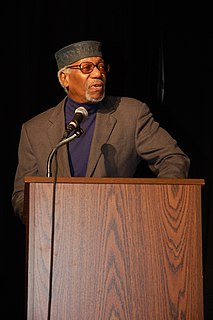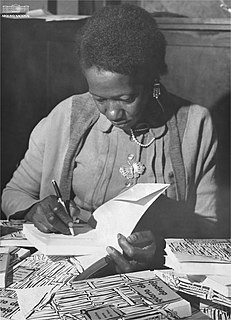A Quote by Herb Boyd
Year after year, author/historian William Loren Katz continues to mine the lodestone of Black culture, and it is simply amazing how often he manages to find new treasures. Here, with the same insight he brought to Black Indians and his other books, the author traces the courageous role of Black women in settling the West. He deftly shows how these pioneering spirits helped stabilize early communities in Texas, Oklahoma, California and elsewhere.
Quote Topics
After
Amazing
Author
Black
Black Culture
Black Women
Books
Brought
California
Communities
Courageous
Culture
Early
Elsewhere
Find
Helped
His
Historian
How
Indians
Insight
Mine
New
Often
Oklahoma
Other
Pioneering
Pioneering Spirit
Role
Same
Settling
Shows
Simply
Spirits
Stabilize
Texas
Traces
Treasures
West
William
Women
Year
Related Quotes
Black women must help black men understand their full potential lies not in denying black women full access to their humanity and opportunity, but in working diligently to overcome the odds that hamper our progress. Yes, some of that is self-imposed, and we must confront it; and much of it comes from outside. But without courageous and brilliant black women, our communities are greatly diminished.
There are many things that black women can continue to do to help black folk. First, black women have historically been among the most vocal advocates for equality in our community. We must take full advantage of such courage by continuing to combat the sexism in our communities. Black women, whether in church, or hip-hop, don't receive their just due. Second, when black women are in charge of child-rearing, they must make ever so sure to raise black children who respect both men and women, and who root out the malevolent beliefs about women that shatter our culture.
'Smart Funny and Black' is basically a live black pop culture game show that I created. We have a live band. We have two contestants that we call 'blacksperts.' They come on stage and compete in games that I've created that test their knowledge of black culture, black history, and the black experience.
I felt like it was a courageous show [Black-ish] from the beginning. We are a black family - we're not a family that happens to be black. But the show is not even about us being black. The show is about us being a family. That is groundbreaking - on TV, the black characters either happen to be black or they're the "black character," where everything they say is about being black. I think that's the genius.
The search for the new black is one of the most elusive quests known to man. It's rumored that Christopher Columbus once searched for the new black and simply gave up. Yet every season we are convinced that some magical chromatic fabric will usurp black as the king of fashion, only to realize later that black still reigns supreme.































